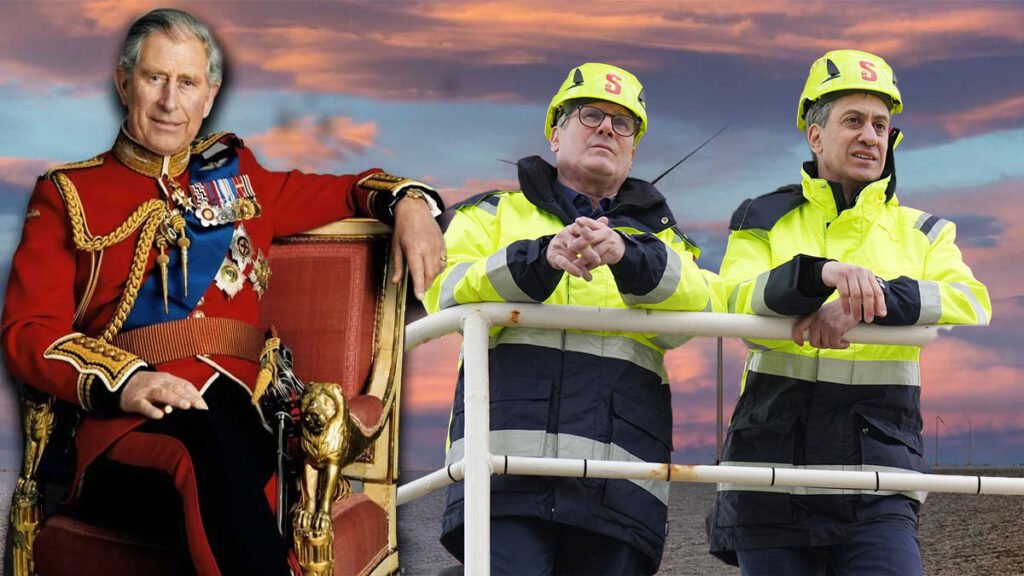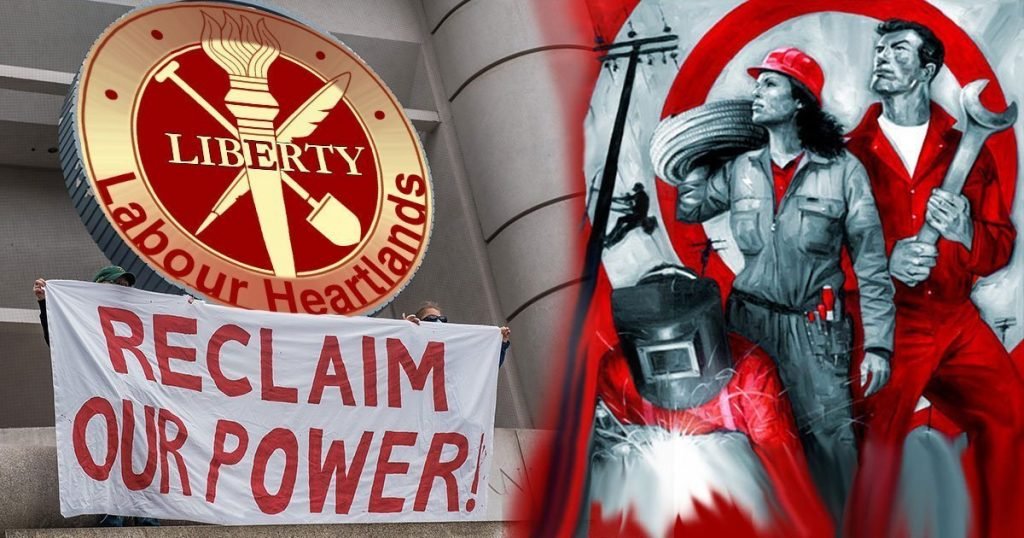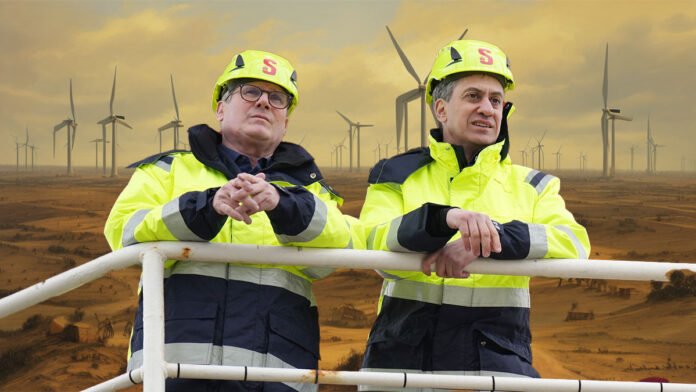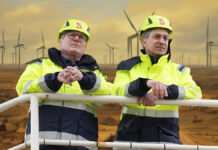Labour’s Energy Secretary Selling Wind in a Can
More theatre, more ‘newspeak‘, Sir Keir Starmer’s Labour government has unveiled its grand plan for energy independence: Great British Energy. This supposedly revolutionary initiative promises to harness the power of British seabeds for wind farm development, aiming to make the UK more self-reliant for energy. However, like many political sleights of hand, this ‘new’ policy is little more than old wine in new bottles, served with a hefty side of public subsidy.
The government has stated that the British seabed owned by the Crown Estate will be used to help build wind farms in plans aimed at making the UK more self-reliant for energy.
Let’s blow away the smoke and shatter the mirrors. The Crown Estate has been leasing seabed plots for offshore wind farms for decades. This isn’t a groundbreaking initiative; it’s business as usual dressed up in patriotic branding. Last year the Crown estate’s first auction of its seabed licences in a decade earned the King’s property manager £879m a year, for up to 10 years, clearing the way for six new offshore wind farms and enough clean electricity generation for more than 7m homes.
Now, don’t misunderstand me. I’m all for clean energy, but I won’t stand idly by while this government peddles its underhanded doublespeak, pretending to innovate when they’re merely repackaging the status quo. The only novelty in this elaborate charade is the government’s audacious scheme to funnel public money into the coffers of private energy companies. It’s a feat of financial prestidigitation so brazen, so utterly shameless, that even the most hardened capitalist might doff their top hat in grudging admiration.
The government, in its infinite wisdom, plans to fund this venture with £8.3 billion gleaned from a windfall tax on oil and gas giants. How generous of them to return a fraction of the obscene profits these companies have wrung from the pockets of struggling Britons! It’s akin to a burglar returning a teaspoon after making off with the family silver. In reality, they are subsidising the energy companies instead of Nationalising them.
Let’s call this what it is: a subsidy for the wealthy masquerading as progress. It’s the same old story of privatising profits and socialising losses, only this time with a green bow tied neatly on top. This government, in its infinite wisdom, seems to believe that the path to energy independence and lower bills lies in further enriching the very corporations that have been gouging the public for years. It’s as if they’ve taken the concept of trickle-down economics and applied it to wind power, apparently hoping that if they make the turbines tall enough, some benefit might eventually reach the ground.
As George Orwell, that great chronicler of political doublespeak, once observed, “Political language… is designed to make lies sound truthful and murder respectable, and to give an appearance of solidity to pure wind.” How apt for our current situation, where pure wind is indeed being sold as solid policy.

Energy Secretary Ed Miliband, with a straight face that would impress even the most seasoned poker player, claims this initiative will “lead to lower bills” for households. However, he then immediately hedges his bets, warning that “it’s not going to happen overnight.” Indeed, Mr Miliband.
They take years to plan, build, and connect to the grid. By the time any theoretical savings materialise, inflation will have likely rendered them as substantial as a light breeze on a scorching day.
What’s truly new about GB Energy? It won’t be public, it won’t produce or generate energy, and it certainly won’t bring your bills down in any meaningful timeframe. The government’s own optimistic projections suggest a potential £300 annual reduction in bills – in 15 years. At current inflation rates, that might cover the cost of a single washing machine cycle, let’s hope there’s a breeze to get your laundry dry or you’ll be out of pocket.
This deal with the Crown Estate is being touted as revolutionary, but it’s merely a continuation of existing practices. The Crown Estate has managed and leased the seabed for renewable energy projects for years. This isn’t innovation; it’s repackaging. The government’s target of generating between 20GW and 30GW of offshore power by 2030 isn’t new either. It’s just added government cheerleading for what was already in practice.
Mr Miliband’s assertion that clean energy is “the best way to keep bills down for good” sounds noble, but the devil is in the details. Nationalising energy production and using profits to invest in genuinely public power generation might achieve that goal. Subsidising private energy companies certainly won’t.
It’s not so much the wind of change but a backdraft from the last decade
Perhaps the most egregious aspect of this policy is its second part – the return of onshore wind farms. Not long ago, newspapers were decrying wealthy landowners receiving millions in subsidies for hosting wind turbines. For years national newspapers called out the bungs made to prominent land owners for leasing land for wind turbines Now, these same publications are championing onshore wind as the solution to our energy woes. The potential for abuse and cronyism is as clear as a cloudless day.
The Guardian now promoting Starmer’s flagship GB Energy once cried a different tune pointing out: “The boom in onshore wind power, likened to a “new industrial revolution”, is being dominated by a small number of private landowners who will share around £1bn in rental fees over the next eight years”.
Rental payments vary and are secret but, say property agents speaking in confidence to the Guardian, landowners can now expect £40,000 a year “risk-free” for each large turbine erected on their land. Those set to benefit include senior members of the royal family and the Forestry Commission in Wales and Scotland.
Estate owners in Scotland – where 1,200 people own two-thirds of the land – have so far benefited the most. The Earl of Moray is thought to get about £2m a year in rent from a 49-turbine windfarm on his Doune estate in Perthshire, while the Duke of Roxburghe stands to make more than £1.5m a year from his 48-turbine Fallago Rig development in Lammermuir Hills.
One such land owner was the disgraced former Tory prime minister David Cameron’s father-in-law, Sir Reginald has been eighth baronet of Normanby who took advantage of his inherited wealth by having two wind farms subsidising his vast income.
The irony is it was David Cameron’s government that effectively stopped onshore wind farms licences doesn’t go amiss, especially in light of his recent revelations and willingness to put cronyism before the people. However, way back in 2015 onshore wind turbines became an extremely controversial subject for Cameron and the Tory Party.
A Landscape Transformed

As applications for wind farm developments surge across the UK, so too does the resistance. From the rugged coastlines of Anglesey to the rolling hills of Powys, grassroots protest groups have sprouted like wildflowers, each fighting their own David and Goliath battle against what they perceive as an invasion of towering turbines.
This wave of resistance, once confined to Wales, now threatens to sweep across England. Mark Sullivan, chairman of the West Midlands group of the Campaign to Protect Rural England, offers a sobering reminder: “The current policy isn’t a blanket ban. Developers who secure community support can still gain permission for turbines. The crux of the matter is that rural England’s inhabitants are reluctant to offer that support.”
The debate transcends mere aesthetics. Wind farm construction is a complex endeavor, involving deep foundations, extensive cabling, substations, and often new road networks. Post-construction, the turbines themselves can bring unforeseen consequences. The rhythmic ‘flicker’ of sunlight bouncing off rotating blades and the low-frequency vibrations transmitted through air and ground can significantly impact local quality of life.
However, it’s not just human residents feeling the pressure. The British Trust for Ornithology, the Royal Society for the Protection of Birds (RSPB), and Wildlife Trusts – while supportive of clean energy initiatives – caution that poorly situated turbines can have devastating effects on local fauna. Birds and bats may be driven from their habitats, and delicate ecosystems disrupted. These organizations have united in calling for comprehensive ecological impact assessments to be conducted “at the very inception of the planning process.”
The Welsh government’s response to these concerns was to implement a zoning strategy, creating “Pre-Assessed Areas for Wind Energy.” This approach effectively designates vast swathes of the Welsh countryside as suitable for wind farms, often overriding local sentiments. This model is now creeping across the border, with English local authorities beginning to incorporate wind development areas into their local plans, anticipating Mr Miliband’s promised planning law reforms.
Northumberland County Council, for instance, has already published an extensive 47-page guide outlining optimal locations for new wind farms within its jurisdiction. While Mr Miliband is currently sidestepping the contentious issue of “zoning,” dismissing it as premature, his determination to see these projects materialize is unmistakable.
“Our primary objective is to lift this ban,” Miliband asserts. “In the current climate, it’s more straightforward to construct an incinerator than to develop an onshore wind project. Such a paradigm is patently absurd.”
As the debate rages on, it’s clear that the push for renewable energy is set on a collision course with environmental and community concerns. The challenge lies in finding a balance that respects local ecosystems, communities, and the urgent need for sustainable energy solutions. The winds of change are blowing strong, but the question remains: at what cost to our rural landscapes and the creatures that call them home?
GB Energy isn’t an energy revolution; it’s a masterclass in political rebranding. It won’t produce energy, it won’t significantly reduce bills, and it certainly won’t solve our energy crisis. What it will do is funnel public money to private companies, potentially line the pockets of wealthy landowners, and give politicians something to point at when asked about their energy policy.
In the end, “Great British Energy” is little more than a great British con. It’s a hollow shell, a paper tiger, a policy so devoid of substance it could float away on the very wind it purports to harness.
In treating us to this elaborate farce, the government has shown its hand. It believes it can get away with anything, so long as it’s wrapped in a Union Jack and given a catchy name. It’s high time we, the British public, called their bluff.

The only GB Energy worthy of the name would be a genuine nationalisation of our plundered natural resources – those very fossil fuels being ruthlessly extracted from the North Sea by rapacious energy conglomerates. These corporate vampires, with their insatiable thirst for profit, are quite literally sucking the lifeblood from their British customers, leaving them anaemic and shivering in the cold of their own homes.
But let us not stop at mere nationalisation. No, what we need is a complete overhaul of our energy system, one that prioritises the needs of the many over the greed of the few. Imagine, if you will, a truly public energy company, one that harnesses not just the wind and waves, but the collective power of the British people. A company that reinvests its profits not in shareholders’ pockets or executives’ bonuses, but in research and development, in community projects, in ensuring that no British citizen ever has to choose between warmth and sustenance.
This, dear reader, is the GB Energy we should be demanding. Not some half-baked, watered-down imitation that serves only to line the pockets of the already wealthy. We need an energy revolution, not a rebranding exercise. We need a system that recognises energy as a basic human right, not a luxury to be parcelled out to the highest bidder.
As we stand on the precipice of an Energy and climate catastrophe, with the winds of change howling around us, we must ask ourselves: will we continue to cling to the tattered remnants of a failed system, be satisfied with theatricals of playing around the edges or will we have the courage to build something truly new, truly British, truly great? The choice, as always, lies with us. The power, if we dare to seize it, is in our hands.
In the words of Naomi Klein, “Climate change is a civilizational wake-up call, a powerful message delivered in the language of fires, floods, storms, and droughts.” With a supermajority government, there is no excuse, they should heed that call, and build an energy system that serves not just our present needs, but secures a liveable future for generations to come. That, and only that, would be truly worthy of the name Great British Energy.
Support Independent Journalism Today
Our unwavering dedication is to provide you with unbiased news, diverse perspectives, and insightful opinions. We're on a mission to ensure that those in positions of power are held accountable for their actions, but we can't do it alone. Labour Heartlands is primarily funded by me, Paul Knaggs, and by the generous contributions of readers like you. Your donations keep us going and help us uphold the principles of independent journalism. Join us in our quest for truth, transparency, and accountability – donate today and be a part of our mission!
Like everyone else, we're facing challenges, and we need your help to stay online and continue providing crucial journalism. Every contribution, no matter how small, goes a long way in helping us thrive. By becoming one of our donors, you become a vital part of our mission to uncover the truth and uphold the values of democracy.
While we maintain our independence from political affiliations, we stand united against corruption, injustice, and the erosion of free speech, truth, and democracy. We believe in the power of accurate information in a democracy, and we consider facts non-negotiable.
Your support, no matter the amount, can make a significant impact. Together, we can make a difference and continue our journey toward a more informed and just society.
Thank you for supporting Labour Heartlands












